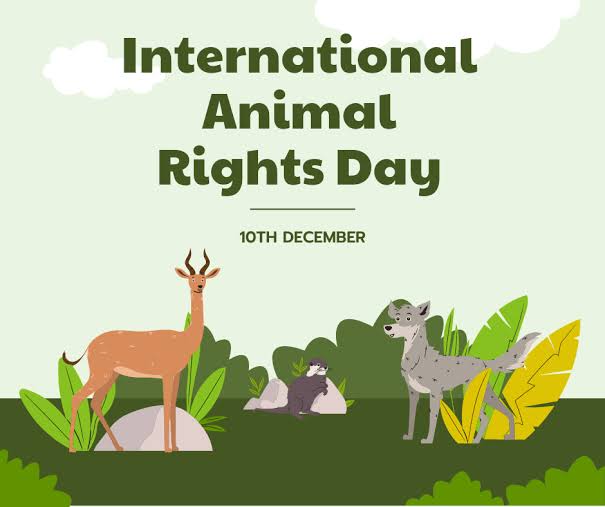International Animal Rights Day: A Stand for Equality and Compassion
4 min read
Every single day you live, you make some impact on the planet- Dr. Jane Goodall Each year on December 10th, International Animal Rights Day serves as a global reminder of the moral duty to protect non-human beings from cruelty and exploitation. This day, coinciding with Human Rights Day, underscores the principle that justice and freedom should extend to all sentient beings. It challenges humanity to acknowledge animals’ intrinsic value, not as commodities but as living beings capable of suffering.
The origins of International Animal Rights Day trace back to the Universal Declaration of Animal Rights (UDAR), proclaimed in 1978 at UNESCO’s headquarters in Paris. This declaration emphasized that animals, as sentient beings, are entitled to rights that protect them from harm and suffering. While the declaration is not legally binding, it has inspired movements worldwide to advocate for legislative changes and foster public awareness about animal welfare. This day is a call to rethink entrenched societal norms that prioritize human convenience and profit over the wellbeing of animals.
The notion of animal rights stems from the understanding that animals have intrinsic worth and deserve protection from unnecessary harm. However, the treatment of animals varies greatly depending on their species or the context in which they are used. For instance, a dog may be cherished as a companion in one home while another dog is abandoned or abused on the streets. Rabbits illustrate this inconsistency vividly; one may live as a beloved pet, another may be used in laboratory experiments, while others are fattened for slaughter or exterminated as pests. These disparities highlight the unequal and often exploitative treatment animals endure, underscoring the need for a consistent and compassionate approach to animal welfare.
Scientific advancements in the study of animal behavior and cognition have significantly contributed to the animal rights movement. Research has shown that animals are socially, emotionally, and cognitively complex beings capable of experiencing pain and suffering. This growing understanding has led to legal advancements in various parts of the world. The United Kingdom’s Animal Welfare Act (2006) initially covered vertebrates and later expanded to include sentient invertebrates like lobsters and octopuses. Similarly, the European Union has banned animal testing for cosmetics and enforces strict factory farming regulations. In New Zealand, certain animals like great apes are granted basic rights, prohibiting their use in harmful experiments. Landmark judgments in India, such as Animal Welfare Board of India v. A. Nagaraja, have reinforced animals’ constitutional right to live with dignity. These legal measures represent significant progress, yet billions of animals worldwide continue to suffer due to human activities.
Despite these advancements, challenges to animal rights persist on multiple fronts. Brutal attacks on innocent animals on daily basis, cultural traditions involving animal sacrifices and spectacles such as bullfighting, perpetuate cruelty under the guise of heritage. Scientific testing on animals, despite the availability of cruelty-free alternatives, continues to inflict immense suffering. Moreover, legal frameworks often provide inconsistent protections, with some species receiving more consideration than others, further exacerbating the plight of animals.
International Animal Rights Day is an opportunity for global reflection and action. Around the world, it is marked by advocacy campaigns, educational initiatives, and policy dialogues aimed at improving animal welfare. Activists demand stronger laws and enforcement to protect animals from cruelty, while governments and organizations engage in discussions to address existing gaps in legislation. Educational programs are organized to foster empathy and awareness about animal rights, and public outreach emphasizes ethical choices, such as using cruelty-free products.
Individuals also play a crucial role in advancing the cause of animal rights. By adopting rather than buying pets, people can give homeless animals a chance at a better life. Supporting cruelty-free brands sends a strong message against the exploitation of animals for cosmetics and household products. Advocacy for legislative changes, such as stricter penalties for animal cruelty, can influence policymakers to prioritize animal welfare. Spreading awareness through social media and community platforms further amplifies the movement, encouraging more people to make compassionate choices in their daily lives.
International Animal Rights Day reminds us that the fight for animal welfare is a reflection of our humanity. It challenges us to expand our moral circle and recognize animals as beings deserving of respect and protection. Scientific discoveries continue to reveal the depth of animal sentience, urging society to reevaluate its treatment of animals and to take decisive steps toward a more equitable world.
The road ahead requires collective effort. Governments must enforce stricter laws, industries must adopt humane practices, and individuals must make informed and ethical choices be show compassion and kindness towards animals. By doing so, humanity can move closer to a future where all creatures are treated with the dignity and respect they deserve. This International Animal Rights Day, let us pledge to create a world where animals are no longer victims of human exploitation but are acknowledged and respected as sentient beings, sharing this planet as equal inhabitants.
*Submitted by –
Noyonika Gogoi, PhD Research Scholar , ARGUCOM, School of Public Policy and Law
& Aditya Trivedi, Advocate, Delhi High Court






